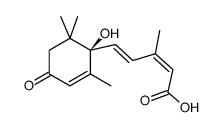(+)-2-顺(式),4-反(式)-脱落酸

(+)-2-顺(式),4-反(式)-脱落酸结构式

|
常用名 | (+)-2-顺(式),4-反(式)-脱落酸 | 英文名 | (-)-CARVYLACETATE |
|---|---|---|---|---|
| CAS号 | 14398-53-9 | 分子量 | 264.31700 | |
| 密度 | 1.193g/cm3 | 沸点 | 458.7ºC at 760 mmHg | |
| 分子式 | C15H20O4 | 熔点 | N/A | |
| MSDS | 中文版 美版 | 闪点 | 245.4ºC |
|
Selection and characterization of single stranded DNA aptamers for the hormone abscisic Acid.
Nucleic Acid Ther. 23(5) , 322-31, (2013) The hormone abscisic acid (ABA) is a small molecule involved in pivotal physiological functions in higher plants. Recently, ABA has been also identified as an endogenous hormone in mammals, regulating different cell functions including inflammatory processes,... |
|
|
CbCBF from Capsella bursa-pastoris enhances cold tolerance and restrains growth in Nicotiana tabacum by antagonizing with gibberellin and affecting cell cycle signaling.
Plant Mol. Biol. 85(3) , 259-75, (2014) Plant cells respond to cold stress via a regulatory mechanism leading to enhanced cold acclimation accompanied by growth retardation. The C-repeat binding factor (CBF) signaling pathway is essential for cold response of flowering plants. Our previously study ... |
|
|
OsRMC, a negative regulator of salt stress response in rice, is regulated by two AP2/ERF transcription factors.
Plant Mol. Biol. 82(4-5) , 439-55, (2013) High salinity causes remarkable losses in rice productivity worldwide mainly because it inhibits growth and reduces grain yield. To cope with environmental changes, plants evolved several adaptive mechanisms, which involve the regulation of many stress-respon... |
|
|
An Arabidopsis R2R3-MYB transcription factor, AtMYB20, negatively regulates type 2C serine/threonine protein phosphatases to enhance salt tolerance.
FEBS Lett. 587(12) , 1773-8, (2013) We have characterized the function of a plant R2R3-MYB transcription factor, Arabidopsis thaliana MYB20 (AtMYB20). Transgenic plants overexpressing AtMYB20 (AtMYB20-OX) enhanced salt stress tolerance while repression lines (AtMYB20-SRDX) were more vulnerable ... |
|
|
Overexpression of the Artemisia orthologue of ABA receptor, AaPYL9, enhances ABA sensitivity and improves artemisinin content in Artemisia annua L.
PLoS ONE 8(2) , e56697, (2013) The phytohormone abscisic acid (ABA) plays an important role in plant development and environmental stress response. In this study, we cloned an ABA receptor orthologue, AaPYL9, from Artemisia annua L. AaPYL9 is expressed highly in leaf and flower. AaPYL9 pro... |
|
|
Reproductive organ and vascular specific promoter of the rice plasma membrane Ca2+ATPase mediates environmental stress responses in plants.
PLoS ONE 8(3) , e57803, (2013) Plasma membrane Ca(2+)ATPase is a transport protein in the plasma membrane of cells and helps in removal of calcium (Ca(2+)) from the cell, hence regulating Ca(2+) level within cells. Though plant Ca(2+)ATPases have been shown to be involved in plant stress r... |
|
|
Abscisic acid sensor RCAR7/PYL13, specific regulator of protein phosphatase coreceptors.
Proc. Natl. Acad. Sci. U. S. A. 111(15) , 5741-6, (2014) The plant hormone abscisic acid (ABA) acts both as a developmental signal and as an integrator of environmental cues such as drought and cold. ABA perception recruits an ABA-binding regulatory component [regulatory component of ABA receptor (RCAR)/PYR1/PYL] a... |
|
|
Functional characterization of two alternatively spliced transcripts of tomato ABSCISIC ACID INSENSITIVE3 (ABI3) gene.
Plant Mol. Biol. 82(1-2) , 131-45, (2013) Alternative splicing can produce transcripts that encode proteins with altered functions. The transcripts of the ABSCISIC ACID INSENSITIVE3 (ABI3)/VIVIPAROUS1 (VP1) gene, which is an important component in abscisic acid (ABA) signaling, are subjected to alter... |
|
|
AtCSP1 regulates germination timing promoted by low temperature.
FEBS Lett. 587(14) , 2186-92, (2013) An Arabidopsis gene trap line (GT606), which disrupted the AtCSP1 gene, exhibited an early germination phenotype that was affected by stratification treatment. Comparative analysis of GUS expression in seeds at the early germination stage, with or without str... |
|
|
Interaction between abscisic acid receptor PYL3 and protein phosphatase type 2C in response to ABA signaling in maize.
Gene 549(1) , 179-85, (2014) Abscisic acid (ABA) is a ubiquitous hormone that regulates plant growth, development and responses to environmental stresses. In recent researches, pyrabactin resistance 1-like protein (PYL) and protein phosphatase type 2C (PP2C) were identified as the direct... |